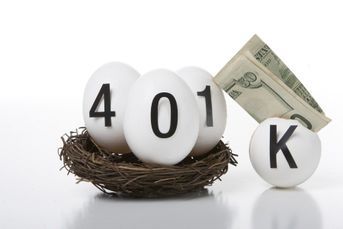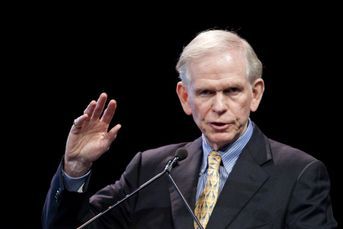IntercontinentalExchange to acquire NYSE Euronext
Combo of stock exchange, futures market could reignite exchange merger mania.
IntercontinentalExchange Inc., the 12-year-old energy and commodity futures bourse, agreed to acquire NYSE Euronext (NYX) for cash and stock worth $8.2 billion, moving to take control of the world’s biggest equities market.
Proposing to combine the owners of the biggest American stock exchange and the second-largest futures market may revive the wave of exchange takeover offers from 2011, almost all of which failed.
ICE, based in Atlanta, will pay $33.12 a share for the owner of the New York Stock Exchange, 38 percent above yesterday’s closing price, according to a statement today. Both boards approved the proposal and the companies expect to complete the transaction in the second half of 2013. Last year, the U.S. Justice Department blocked a joint hostile bid by ICE and Nasdaq OMX Group Inc. (NDAQ) for the New York-based company on concern the combination would dominate U.S. stock listings.
Merging NYSE Euronext, which owns the biggest exchanges by value of listings in the U.S., France and the Netherlands, with the second-largest futures market underscores both the growing importance of derivatives and the diminishing influence of the 220-year-old NYSE. The Big Board, once the benchmark for global free markets, has seen its share of trading in stocks listed on the exchange decline to 21 percent from 82 percent.
“Not only are they losing volume, they’re also getting squeezed in their margins because of all these competitors who have different corporate structures,” Thomas Caldwell, who oversees about $1 billion as chairman and chief executive officer of Toronto-based Caldwell Securities Ltd., said in a telephone interview. His firm owns shares of NYSE and ICE. “They’re languishing as everyone sits and waits for cash equity volumes to pick up, which may or not occur for several years.”
Shares Climb
Shares of New York-based NYSE Euronext rallied 24 percent to $29.77 in European trading before being halted. The stock closed at $24.05 in New York yesterday, bringing this year’s decline to 7.9 percent.
Jeffrey Sprecher, the chief executive officer of IntercontinentalExchange, will head the combined company, with NYSE CEO Duncan Niederauer becoming president. The companies plan to explore an initial public offering for NYSE’s European equity unit.
ICE’s market value has grown to $9.3 billion as its shares rose 6.4 percent in 2012, data compiled by Bloomberg show.
A takeover would mark an unusual success after more than $32 billion of exchange takeovers failed since October 2010.
“This is a much easier deal to get done,” said Brian Barish, who helps oversee about $7 billion including about 4 million NYSE Euronext shares as president and chief investment officer of Denver-based Cambiar Investors LLC. “When Nasdaq was talking about doing something with NYSE, there were obvious antitrust market concentration problems. ICE is a totally different story because they don’t do equities.”
Unsolicited Bid
Sprecher joined Nasdaq OMX CEO Robert Greifeld in an unsolicited bid for NYSE Euronext in April 2011. The offer, scuttled by the Justice Department seven weeks later, sought to derail NYSE’s pending merger agreement with Deutsche Boerse AG. (DB1)
The merger with Deutsche Boerse was rejected by European competition authorities in February. NYSE Euronext subsequently began a cost-cutting plan known as Project 14 and said on Nov. 6 that it generated savings of $82 million so far this year, 33 percent of the total $250 million expected by the end of 2014.
In addition to the New York Stock Exchange, the company operates bourses in Paris, Lisbon, Brussels and Amsterdam and London-based Liffe, Europe’s second-largest derivatives market. NYSE adjusted earnings were $653 million in 2011 on revenue of $4.6 billion. The company posted profit of $357 million in the nine months through Sept. 30, down 32 percent from the same period last year.
The New York Stock Exchange, formed in 1792 under a sycamore tree on Wall Street, became the center of American capitalism through its grip on trading and listings for companies from Ford Motor Co. to AT&T Inc. (T) and DuPont Co.
Faded Reputation
The Big Board’s reputation faded in the last decade when scandals highlighted the potential for collusion on the NYSE floor and faster technology reduced the need for middlemen. In September 2003, Chairman Richard Grasso ended a 36-year career at the exchange as regulators and directors said a $140 million pay package called his leadership into question.
Grasso’s successor, John Thain, orchestrated the 2006 reverse merger that gave the NYSE control of Chicago-based Archipelago Holdings Inc. and turned the member-owned exchange into a public company. By then, regulatory directives aimed at lowering transaction costs were in the process of cutting the NYSE’s market share.
Buying NYSE Euronext is a way for Sprecher to get access to the company’s derivatives platform, Liffe, Diego Perfumo, an analyst at Equity Research Desk LLC, an investment advisory firm in Greenwich, Connecticut, said in a phone interview.
Liffe Access
“When Deutsche Boerse and NYSE Euronext tried to merge, ICE immediately partnered with Nasdaq and tried to poach NYSE away,” Perfumo said. “ICE was going to keep Liffe and Nasdaq was going to keep the rest of NYSE. Short-term interest rate futures are 70 percent of Liffe’s business and the other 30 percent is equity derivatives, which is an undervalued asset within NYSE Euronext. What Sprecher is after is Liffe.”
Sprecher founded ICE as an online marketplace for energy trading. Its seed capital came from settlement money collected by Sprecher’s previous company, Western Power Group, in 1996 tied to a lawsuit over an agricultural-waste burning power plant in Southern California.
Intercontinental (ICE) offers contracts based on European energy commodities such as Brent crude, natural gas and heating oil at its London-based ICE Futures Europe exchange. In the U.S., it offers futures on agricultural commodities such as coffee, cocoa and sugar as well as Russell stock indexes and currencies at ICE Futures U.S. The company owns the world’s largest clearinghouse for credit-default swaps, ICE Clear Credit LLC.
Enhanced Products
“The combined company could enhance the products offered across asset classes, cross-market to different client bases with different needs, expand ICE’s reach in Europe to NYSE’s exchanges and drastically reduce the cost of futures regulation,” Joseph Greco, a managing director at Meridian Equity Partners, a New York-based broker that has traders on the NYSE floor, said in an interview. “For NYSE it would augment the futures and derivatives footprint domestically.”
With more than 1,000 employees, IntercontinentalExchange earned $521.7 million in net income from revenue of $1.3 billion in 2011 when its profit margin was 39 percent. For the first nine months of the year, 87 percent of Intercontinental’s revenue came from clearing and transaction fees.
As of Sept. 30, the company had $1.24 billion in cash and cash equivalents and had issued $400 million in bonds due in 2018 and 2021, according to data compiled by Bloomberg.
Add Scale
Equity-exchange executives have sought to add scale through mergers and acquisitions after the number of U.S. and European trading venues increased by about 50 in the past decade, driving down profitability. Stock trading has also declined, with daily volume of U.S. exchange-listed securities averaging 6.44 billion shares this year, the lowest level since at least 2008, according to data compiled by Bloomberg.
Populist outcry, antitrust concern and some of the most volatile markets on record have prevented the completion of more than $32 billion in announced transactions, according to data compiled by Bloomberg on deals since October 2010 that were valued at $1 billion or more.
The 25-company Bloomberg World Exchanges Index (BNWEXCH) has rallied 11 percent this year after tumbling 19 percent in 2011. The gauge of market operators averaged gains of 35 percent a year between 2003 and 2010.
Knight Capital Group Inc. (KCG), pushed to the brink of bankruptcy in August by a trading error, chose this week to pursue a takeover by Getco LLC over a competing offer from Virtu Financial LLC, three people with direct knowledge of the matter said. The Chicago-based high-frequency trader offered $3.75 a share for Knight, one-third of it in stock, for a total value of $1.4 billion, according to a statement yesterday.
— Bloomberg News —
Learn more about reprints and licensing for this article.








